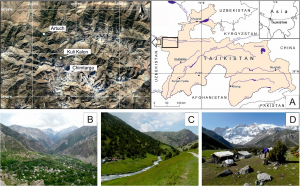The indigenous societies of the Fann Mountains were and remain dependent on the resources of the natural environment. The present study aimed at investigating the relationship between mountain communities and the use of ecosystem services that are subject to change due to the influence of social, economic, and political conditions.
The study made use of the concept of ecosystem services, which extends the scope of analyses of the socio-ecological system to the sphere of cultural relations. The application of this approach was crucial due to the dominance of juniper forests within the ecological system, given that the juniper, as a result of its connection with religion and local traditions, considered a key species for the mountain societies. The identified structure of the ecosystem services indicates the significance of the juniper in providing the indigenous community with services which, due to the economic situation of the society are characterised by greater value (wood, food, medicine) than cultural ecosystem services. Identification of ecosystem services taking into account the concept of cultural keystone species should be a starting point for the protection and restoration of juniper forest. The results of field and social studies have shown that the stable maintenance of juniper forests ensures the existence of key species as the most important ecosystem services, e.g. provisioning, regulation and maintenance and cultural, indicating the correct relations between the society and the protection of mountain areas. The obtained results showed that the inhabitants claim that juniper forests with the participation of Juniperus semiglobosa and Juniperus seravschanica are the main elements determining not only the functioning of mountain ecosystems, but also the communities living there. This approach is capable of ensuring inclusive management of the socio ecological system of the Fann Mountains
https://www.sciencedirect.com/science/article/pii/S2212041621000139
